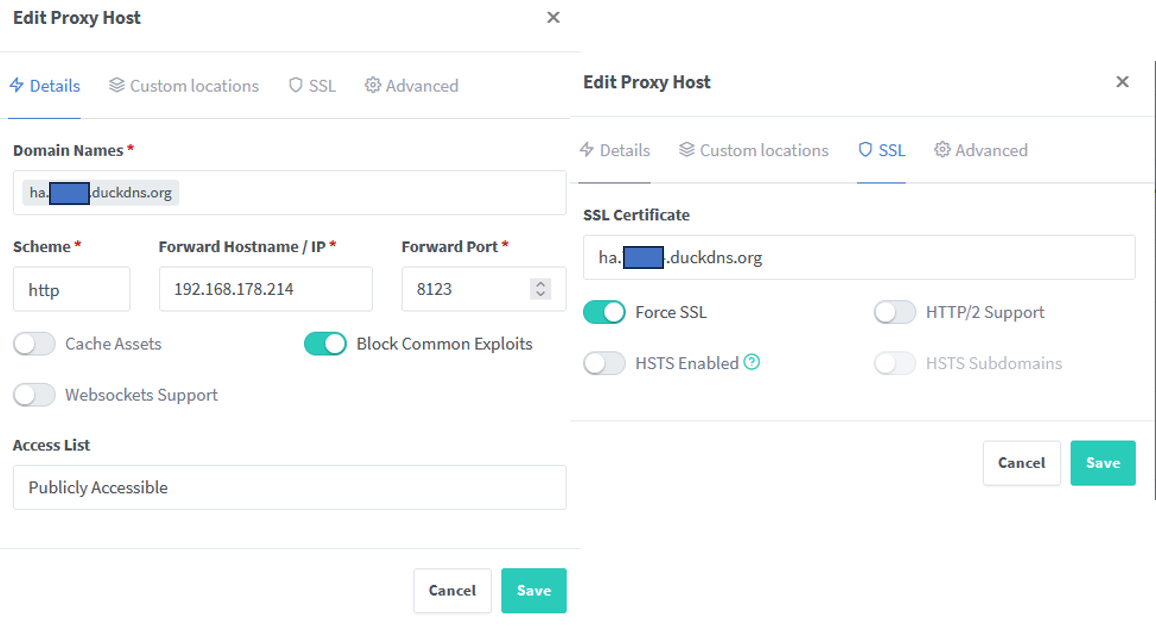Hey Guys,
so I still have no clue about most of the stuff im doing hence why I am doing it :)
I have a ubuntu system running all kinds of docker containers and I want to expose homeassistant and vaultwarden to the internet.
Now I have set up a Duckdns account, I have setup my Router (fritzbox) to update the dyndns settings, I have set up my homeassistant the following:
homeassistant:
internal_url: http://192.168.178.214:8123
external_url: https://ha.xxxxx.duckdns.org
http:
use_x_forwarded_for: true
trusted_proxies:
- 172.22.0.0/24
Following is my Homeassistant Configuration:
homeassistant:
container_name: homeassistant
image: "ghcr.io/home-assistant/home-assistant:stable"
volumes:
- /homeassistant/:/config
- /etc/localtime:/etc/localtime:ro
restart: unless-stopped
network_mode: host
privileged: true
ports:
- 8123:8123
- 5683:5683
nginx-proxy-manager:
container_name: nginx
privileged: true
image: 'jc21/nginx-proxy-manager:latest'
ports:
- '80:80'
- '81:81'
- '443:443'
environment:
DB_MYSQL_HOST: "nginx-db"
DB_MYSQL_PORT: 3306
volumes:
- /nginx/data:/data
- /nginx/letsencrypt:/etc/letsencrypt
nginx-db:
container_name: nginx-db
image: 'jc21/mariadb-aria:latest'
environment:
volumes:
- /nginx/mysql:/var/lib/mysql
vaultwarden:
container_name: vaultwarden
image: vaultwarden/server:latest
restart: unless-stopped
volumes:
- /vaultwarden:/data/
ports:
- 8125:3012
- 8124:80
environment:
- DOMAIN=https://vw.xxxxx.duckdns.org
- LOGIN_RATELIMIT_MAX_BURST=10
- LOGIN_RATELIMIT_SECONDS=60
- ADMIN_RATELIMIT_MAX_BURST=10
- ADMIN_RATELIMIT_SECONDS=60
- ADMIN_TOKEN=
- SENDS_ALLOWED=true
- EMERGENCY_ACCESS_ALLOWED=true
- WEB_VAULT_ENABLED=true
- SIGNUPS_ALLOWED=true
I have forwarded the ports in the router.
I have set up nginx the following:

Issue is when I open the website, it will give me the error that hsts is enabled, even though I definitely did not check this option ( and I never did (today!).
What is the reason for this?
Do I have to set some sort of header?
Same thing with vaultwarden, basically I set this up 1:1 except for the url whichi is vw.xxxxx.duckdns .org.
What cert did you put on the proxy answering the inbound? Usually that error means either the browser doesn't like the cert, or it's connecting to 80, and modern browsers really fight you on that sometimes. Also, cache. Clear your cache if you're bouncing between internal URL/IP and the public.
I assume you just want to expose to internet to learn art of reverse. Otherwise there's better ways.
Mainly I want to expose it so I can access my stuff remotely. What would you recommend otherwise? Traefik looks alot more difficult to me from the get go but I haven't tried it out yet (because I dont know where to start) Issue is just that I have a basic understanding about docker/ubuntu stuff now (or I know how to manipulate stuff like I want) but basically everything with Web and https is a big black hole for me which I can't seem to grasp yet.
Yeah, it's a lot. It's a very large field, and you're playing in two or three areas here.
Look at a couple of overlay options. ZeroTier is the one I remember off top of my head. There are others, Google alternatives. These use a coordination server. Some are a hosted service, but there's some that you host yourself. These are supposed to be pretty easy. You watch a couple of videos on these, I bet you're be fine.
Wire guard offers more traditional VPN. You can tunnel your device back to your network. Some routers offer a VPN option. There's open sense, ddwrt, etc. Again, lots of videos.
Since you said you mostly wanted remote access, I strongly suggest not opening services to public and use VPN.
You can still learn reverse proxy too, but just do it internally, even though it wouldn't technically be needed. This will be much safer and learner friendly.
I have ridiculous amounts of services running, but I use gateway router VPN to access most of them.
using a vpn or similar is not really an option as I have famiy members accessing it and I dont want to always connect using a vpn just for example to open my garage or accessing my shopping list. Security wise I just use 2FA so I dont think thats the issue.